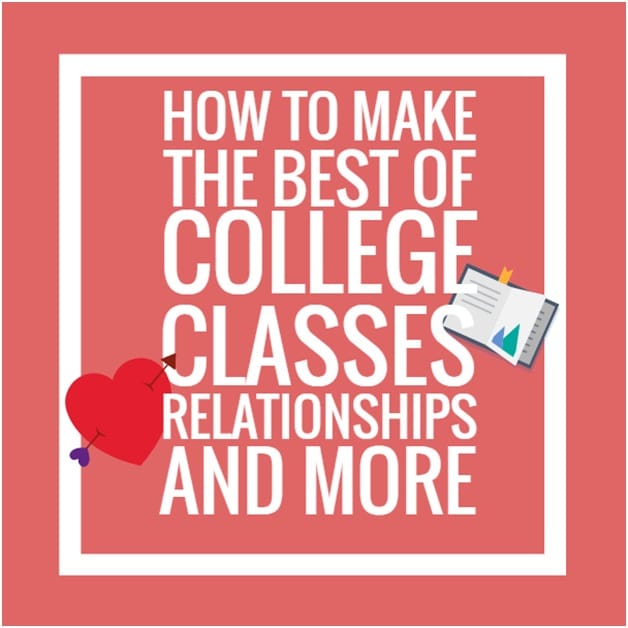
The move from high school to college often entails a transition from a sheltered life at home to one with much more responsibility and independence.
Finding yourself surrounded by strangers and without the comfort of friends and family to fall back on can be a stressful experience for even the most outgoing of people. And if you’re shy or prone to anxiety, it may very well seem like one of your worst nightmares.
On top of that, add the stress of balancing a full class load with a decent social life and perhaps even a romantic relationship—and you may find yourself stretched to your very limit.
But you need not panic:
Whether you’re uneasy at the prospect of socializing with strangers or you’re worried about your academic performance suffering at the expense of extracurricular activities or a significant other, we have some good advice for you.
Navigating the roommate situation
The first significant issue you may come across as a college freshman is sharing a room with a complete stranger (or strangers).

Keep in mind:
Chances are your roommate will be a fellow first year who is just as freaked out about the novelty of life away from home as you are.
Your student life will be off to an infinitely more pleasant start if you get along with your roommate.
So for your own sake, try to give your roommate(s) the benefit of the doubt.
Even if at first glance your roommates seem like a complete disaster, consider cutting them some slack. After all, they’re just beginning this new life, too.
And they may surprise you.
For pleasant cohabitation, you’ll need to get to know your roommate’s habits, interests, and preferences so you can find some common ground.
Even students with polar-opposite personalities can live together in peace if they respect and tolerate each other’s needs and desires.
There’s no need to assert your dominance, especially since it will only lead to tension and conflict in the long run.
Making new friends

You and your high school posse probably go way back together, having stuck with each other since middle or even primary school.
If that’s the case, you may find yourself a little rusty when it comes to making new friends.
Your first year of college will typically kick off with an orientation week. This will be a great opportunity to start reaching out to people, so you can get your first student days off to a positive start.
The people you hang out with during your first weeks of college are almost never the ones who become your closest friends a couple years down the road.
But you should make an effort to meet them anyway.
Having people with similar interests to share new experiences with will help ease you into the student life.
Staying true to yourself
Going to a place where nobody knows you can be very liberating.
You’ll have the rare opportunity to completely reinvent yourself, and start almost from scratch.
Be sure to explore interests you’ve never had the chance to pursue before, and don’t be afraid to try new things.
However:
Remember to stay true to yourself and be your own person.

For example, if parties aren’t really your cup of tea, don’t force yourself to keep attending them simply because everyone else you know seems to be doing just that.
No matter how you feel, you can be sure that there are other people on your campus who share your feelings and attitudes.
All you’ve got to do is find them.
How do you find like-minded people?
Your college campus will likely be packed with an array of student groups, clubs, and associations.
Most schools host a club or activities fair during orientation week precisely to allow freshmen to become familiar with these student organizations.
At the fair, you’ll be able to meet representatives of most groups to find out about their activities and membership requirements.
This is the part of your orientation week that you really don’t want to miss.
Whether it’s the choir, the lacrosse team, the political science club, or the university newspaper, there will almost certainly be at least one group that will catch your eye.

Extracurricular activities
At its best, college is the place where you make friends and career contacts for life.
Your classes and schoolwork are important—there’s no arguing about that. It’s what you’re paying the big bucks for.
However:
You’ll be surprised to find out that your success after graduation often depends not on your GPA, but on the skill set and the network of contacts you’ve developed during your college career.
Extracurricular activities will provide you with ample opportunity to network, gain relevant experience, and polish your practical skills.
Not to mention the fact that they’ll look fantastic on your resume.

Tips for picking extracurricular activities that are right for you
- Look into alumni celebrations.
Stop by the alumni office for details about alumni group activities.
If a group has its own alumni sub-celebration, it’s a good indication that the group is cohesive and forms lasting bonds.
For example, the marching band at the University of Pennsylvania, the , and the Glee Club all have regular reunion activities that bring alumni together long after they’ve graduated.
- Pay attention to the enthusiasm of the club representatives.
Another sign of a healthy and effective organization is the number of people who are willing to come out and staff the club booth at the activity fair.
Seeing a number of active, enthusiastic members at the booth is a sign that the group is well organized and has good internal communication.
It is also a strong indication that the group is successful.
People who are getting their social needs met through a club are generally happy to share it with others.

- Consider how long the club has been in existence.
A well-established group will probably have a yearly schedule of activities and events.
These will be reliable ways to both get to know the group’s members better and meet people outside of the club.
- Join newer clubs to take advantage of more leadership opportunities.
In a newer club, you may get the chance to become an officer—or even the president!
You might start off feeling like a big fish in a small (but hopefully growing) pond. But if you have a clear vision and ambition, you can build a solid foundation.
There will be more administrative work for you to do, and your responsibilities will likely surpass those of a regular member.
It will be a great opportunity for personal growth.
Practical leadership experience will come to your aid both socially and professionally over the course of your future career.

Furthermore, leading a new student organization will likely put you on the map and make you better known around campus.
This will, in turn, exponentially increase your social circle.
Your leadership position will provide you with an excuse to talk to strangers. And similarly, they will more likely find you approachable and start conversations with you, even without a formal introduction.
- Evaluate whether the groups or clubs are effective.
You do not want to waste your time on a group that is struggling big time or is well on its way to a torturously slow death.
Keep in mind that failing student groups often fail for similar reasons:
- They are poorly organized or outright mismanaged.
- Their volunteer members turn out to be neither well intentioned nor competent.
- The newest members’ interests do not match the group’s original purpose.

- Find groups that fit in with your interests.
If you’re a political science major, you might decide to join the organizing teams of conferences like Model United Nations or Model European Union.
Besides being a definite boost to your resume, your experience in these organizations can directly affect your future career prospects.
Groups that relate to your academic or professional interests will provide you with opportunities to meet established professionals in your field, who could perhaps even write reference letters for you in the future.
- Be open to groups that are entirely new or unexpected.
Perhaps your best strategy to meet new people is to seek out student groups focused on entirely unfamiliar interests and activities.
If you have never knitted, bowled, written poetry, learned Indian traditional dance, or sung madrigals—but have always secretly wanted to—college might be just the place for you to try it out.
You will certainly meet people you would not otherwise have encountered. And you might even find a new passion in life or in love.

Tips for balancing studies with extracurricular activities
To make sure that student organizations and extracurricular activities won’t reflect negatively on your studies, develop a time management plan that will allow you to live a well-rounded life as a student.
- Keep a daily planner in which you record important appointments and events.
- Schedule regular study time into your agenda so that you won’t overexert yourself.
- Consider having a study partner in each of your classes to help keep you motivated and accountable for class assignments.
- Take it slow. If you’re still worried about being stretched too thin, simply cut down on your extracurricular activities without eliminating them completely.
- Attend events on campus, such as plays and guest lectures. This will allow you to maintain a social life without cutting down your study time because you won’t be limited by regular extracurricular commitments. Campus events will only take up around two hours of your time, a couple days a week. But they’ll make you feel like a member of the student community.

Tips for balancing your studies with a romantic relationship
Like school, relationships demand a lot of time and effort. And striking a perfect balance between school and romance can be extremely tricky.
Many students enter their first serious relationship at the same time they begin college.
And while relationships can be emotionally uplifting and help you get through difficult moments at school, even the best relationships can potentially serve as a distraction from your studies.
In trying to strike the right balance, here is some advice to consider.
- Don’t rush into a relationship.
Many times, students meet someone very early on in their college career, feel some attraction, and jump straight into the deep end of a relationship.
As a result, they stop making any new connections at all—whether for friendship or romance—as they become completely wrapped up in that single person.
- Learn to communicate with your partner.

Studies show that communication is key to building a successful relationship. And it plays a huge role in balancing your relationship with other aspects of your life.
Ideally, your partner should know what your educational goals are and support you in your pursuit of them.
If your partner complains that you spend too much time studying instead of being with them, this is a serious red flag.
- Manage your time effectively.
Studying requires a great deal of time. And relationships require an immense time commitment as well.
Studying all the time and ignoring your partner is not the best idea if you wish to maintain your relationship.
On the other hand, ignoring your studies to spend all your time with your partner doesn’t make any sense either.
A good partner will understand and appreciate this dilemma.
Keeping the proper balance between school and your relationship requires you to manage your time well.
It’s a good idea to set aside specific times to study and to designate a specific night to spend time with your partner.
- Learn to prioritize.

Think about the relative importance that you place on your education versus your relationship.
If you expect to go to graduate school or get a great job after you graduate, you will need to dedicate more effort to your schoolwork—meaning you’ll have to spend more time studying than the average student.
On the other hand, if you are in a serious relationship but have little interest in school, you may want to consider taking a break from school.
Taking classes you have no interest in is a waste of time and money.
- Be flexible.
Flexibility is also important in keeping the right balance between school and relationships.
In school, there will inevitably be times when your plans change.
On a day-to-day level, you may have to cancel a night out with your partner because a professor assigned a last-minute paper.
On a deeper level, you may find that your career goals change as you progress through college.
Your partner should be flexible with you and support you throughout these changes.
- Remember that it is possible to succeed in both.

Relationships do not necessarily have to have a negative effect on your studies.
College is a stressful time for many students, and a solid, supportive partner can provide important emotional support.
A good relationship can give you a sense of purpose. Sometimes, your partner can also serve as a source of motivation.
- Know that the challenge will help you get to know your partner better.
Trying to balance school and relationships can actually help you learn more about your partner.
- Does your partner support you in your studies?
- Do they encourage you to finish studying before going out?
If they do, then this shows that your partner is looking out for your best interests.
This is a great trait in a partner.
On the other hand, if your partner distracts you or complains about being ignored, your partner probably cares more about themselves than about you.
Obviously, this can sabotage your educational career and is not promising for your future together.

Many dating experts believe that you can learn a lot about your partner from how they react to stressful situations.
Focusing on school can actually encourage you to get out of a bad relationship quickly before your grades (and your future) are negatively affected.
And if you’re one of the lucky ones in a healthy and positive relationship, your partner can encourage you to accomplish even greater things in school!